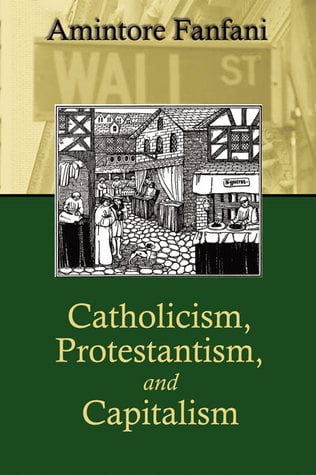Amintore Fanfani (1908-99) was an economic historian whose scholarship focused on the origins of capitalism and questions of economic and social equity. In his early career, he was part of a broader Catholic and conservative intellectual movement that was active during the interwar years and included the English Distributists and the Southern Agrarians. Like these Anglo-American writers, Fanfani and his Italian circle were highly critical of both socialism and capitalism. They spent their careers developing critiques of, and seeking Christian alternatives to, these secular schools of political economy. While most of his peers were academics and literary men, Fanfani was deeply committed to practical politics. Later in life, he served in the Italian Parliament, as prime minister of Italy, and as president of the U.N. General Assembly.
Many scholars trace the origin of capitalism to the Reformation, but Fanfani locates it in the late Middle Ages. The social conditions of that time, characterized by increased risk, uncertainty, and cosmopolitanization, were favorable to the rise of capitalism. In Fanfani’s view, however, capitalism is not unique to a given people or place. The “spirit of capitalism” is something latent in the human condition and can emerge anywhere, given the right social circumstances. It is a spirit that places individual material gratification above the good of neighbor and of community. Most significant is that the desire for individual material gain is a radical departure from precapitalist economic practices. In the Middle Ages, economics was conditioned by the teachings of the Gospel. Work was understood in relation to the Beatific Vision, the culmination of life’s spiritual journey, in which every action could bring a man closer to God and Heaven. Therefore, all economic activity was moral activity. And one of the Church’s main roles was to ensure that morality remained wedded to economics. Once religious restrictions on wealth and work were ignored, however, the economic sphere gradually cut its ties to Christian social teaching.
Fanfani makes a subtle and important point on the relationship between work and wealth when he addresses the difference between lawful and unlawful means of acquiring wealth. Even most non-Christians reject the idea of money-making through such unlawful means as bribery, theft, and extortion. This was not the main problem, however, with respect to the development of capitalism. For Fanfani, the autonomous development of the economic sphere depended on the unlawful use of lawful means, the unlimited accumulation of wealth. According to the traditional Christian ideal, wealth was simply a means of satisfying various human needs. Once these were satisfied, additional wealth was superfluous, miserly, and sinful. By contrast, modern man never has sufficient wealth. For him, money is not a means whereby to live but an end in itself. We now live to work, in order to fulfill unlimited desire.
The most effective way to increase material desire was (and is) through advertising. The scale and intensity of advertising accelerated as capitalism expanded. During the Middle Ages, such displays of bribery and enticement were prohibited as direct affronts to common decency and reason, employed explicitly to arouse passion and to promote the culture of appetite that capitalism requires to thrive. (Fanfani calls advertising the new word that has replaced the old word of the Gospel.) Capitalism finally came into its full glory when it captured the state, which once defended religious laws. Under capitalism, however, it defends economic laws. Just as the individual attained a “free conscience” with respect to work and wealth, so the state was freed from upholding religious standards. The growth of mass democracy is part of this political transformation. The masses are not interested in moral issues, only material ones. Modern democracy is nothing but a referendum on economics.
While capitalism defends the idea of a free conscience with respect to economics, Fanfani does not perceive a direct relationship between this and the Protestant idea of a free conscience in spiritual matters since, in his opinion, the compatibility between Protestantism and capitalism has more to do with the Protestant view of salvation. Early Protestants still held the medieval Catholic view of work and wealth and condemned such practices as usury and miserliness. Fanfani argues, however, that this situation changed as Protestant theology matured. The emphasis Protestants placed on salvation through faith, as opposed to the Catholic idea of salvation through both faith and works, helped to separate work from faith in a way that had already occurred during the evolution of capitalism. Thus, capitalism and Protestantism, though having different social origins, arrived at the same social conclusion: namely, that work and spirituality operated under autonomous sets of rules. The compatibility of these worldviews led eventually to the wholesale acceptance of capitalism by most Protestant sects by the 17th century.
Today, capitalism is fully accepted by most Catholics, especially in the United States. Few know that their ancestors once held radically different views. Fewer still are aware that the Catholic Church has never changed Her teachings on capitalism and has consistently issued encyclicals that underscore this fact. The Church has never condemned private property, the market, or technology, but She has condemned the abuse of these things. Thus, Catholics such as Llewellyn Rockwell and Michael Novak, who earn their living as capitalist apologists or use the capitalist system to enhance their wealth and power, are betraying their Faith. It is time that devout Catholics and other conservative Christians restore some sanity in the economic sphere by applying the Gospel to every aspect of their lives, including the way they earn, invest, and spend their money. A good place to begin is by reading this classic book and many others that have recently been reissued by IHS Press, which is dedicated to publishing works that defend the social teachings of the Catholic Church.
[Catholicism, Protestantism, and Capitalism, by Amintore Fanfani (Norfolk, VA: IHS Press) 192 pp., $14.95]

Leave a Reply